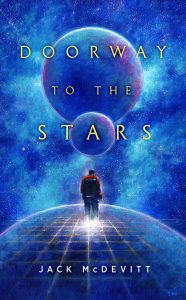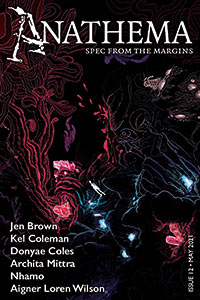Russell Letson Reviews Doorway to the Stars by Jack McDevitt
 Doorway to the Stars, Jack McDevitt (Subterranean 978-1-64524-188-1, $40.00, 107 pp, hc) February 2024. Cover by Edward Miller.
Doorway to the Stars, Jack McDevitt (Subterranean 978-1-64524-188-1, $40.00, 107 pp, hc) February 2024. Cover by Edward Miller.
In two novels nearly 20 years apart, Jack McDevitt offered a platter full of puzzles and oddities. Ancient Shores (1996) and Thunderbird (2015) begin with the discovery of certain artifacts and buildings on what, 12,000 years earlier, had been the shore of the inland sea of Lake Agassiz in North Dakota: a sailboat, a boathouse, and what looks for all the world like a vacation cabin, all perfectly preserved and in fact imperishable – along with a set of portals to what prove to be various locations all across the galaxy, and one outside it, looking inward. One complication to this mystery is that the discovery site is now Sioux tribal land, and conflicts over control and preservation of it are central to both novels. At the end of the review of Thunderbird, I wrote, ‘‘I don’t expect another sequel, but it’s clear that these stories will continue in their own realm of possibilities.’’ Now McDevitt has returned again to the puzzles left unresolved in a slim novella, Doorway to the Stars.
Some of the novels’ issues were resolved when the Sioux nation was given guardianship of the site that came to be called the Roundhouse. Researchers were allowed carefully monitored access to the portal system’s destinations, revealing, among the range of destinations, several inhabited worlds, including one with nonhumans who look like clothed gorillas but otherwise sound like familiar McDevitt aliens: ‘‘They lived in a cabin with electric power, and they owned books.’’ They also ‘‘were clearly nervous’’ about their first visitors, but eventually played host to an exploring linguist.
Despite these unalarming discoveries and the possibility of even more dramatic and scientifically significant ones, at the opening of Doorway, tribal chairman James Walker has removed the enabling equipment and dumped it in Lake Superior, fearing the cascading effects should the teleportation technology be understood and adapted to terrestrial travel. The first half of the story follows the fallout from that decision: the local economy’s benefits from tourists and researchers, the displeasure of federal officials, the recovery of the teleportation gear, and the resumption of research and exploration. The second half is mostly seen from the viewpoint of Jack Swiftfoot, the pilot who helped dump the Roundhouse machinery in Lake Superior, and is built around a tour of Roundhouse destinations, along with a familiar McDevittian set of television interviews, dinnertime conversations, and high-school-assembly presentations.
Considering the possible stakes and the scope of the possible answers to profound questions, it follows a decidedly unmelodramatic course that involves extended contact with inhabitants at Roundhouse destinations that eventually leads to a partial answer to the big questions about the identity and motives of the beings who set up the transport system. The answers should not surprise anyone who has read a sufficient sample of McDevitt’s other work. Doorway to the Stars is not necessarily the last word from this story-space, but it does resolve the major issues it raises. (And as a bonus, there is what has to be a deliberate homage to the Overlords of Arthur C. Clarke’s Childhood’s End.)
Russell Letson, Contributing Editor, is a not-quite-retired freelance writer living in St. Cloud MN. He has been loitering around the SF world since childhood and been writing about it since his long-ago grad school days. In between, he published a good bit of business-technology and music journalism. He is still working on a book about Hawaiian slack key guitar.
This review and more like it in the March 2024 issue of Locus.
 While you are here, please take a moment to support Locus with a one-time or recurring donation. We rely on reader donations to keep the magazine and site going, and would like to keep the site paywall free, but WE NEED YOUR FINANCIAL SUPPORT to continue quality coverage of the science fiction and fantasy field.
While you are here, please take a moment to support Locus with a one-time or recurring donation. We rely on reader donations to keep the magazine and site going, and would like to keep the site paywall free, but WE NEED YOUR FINANCIAL SUPPORT to continue quality coverage of the science fiction and fantasy field.
©Locus Magazine. Copyrighted material may not be republished without permission of LSFF.






